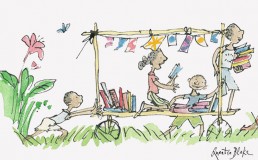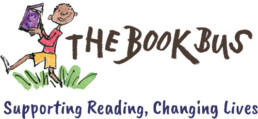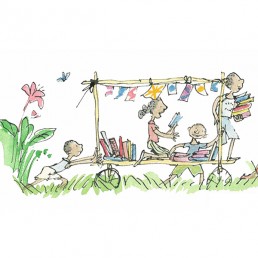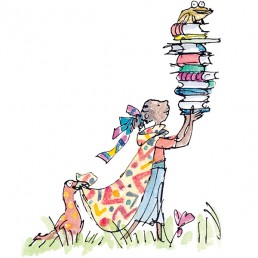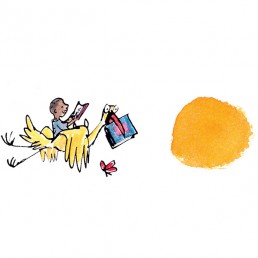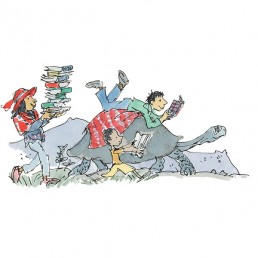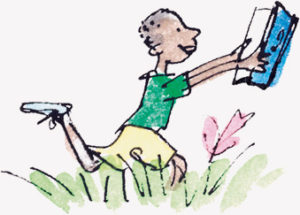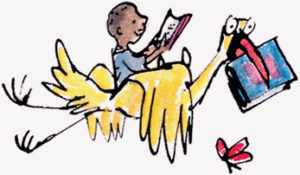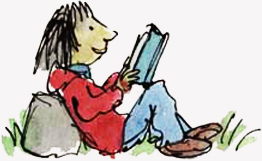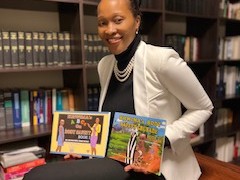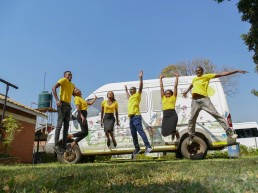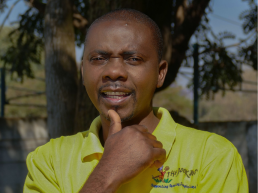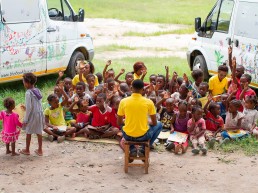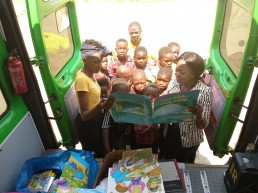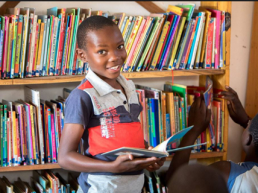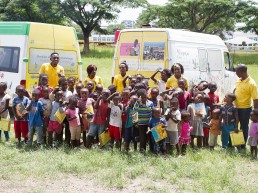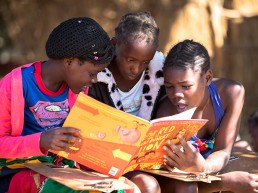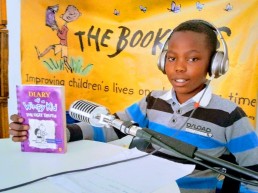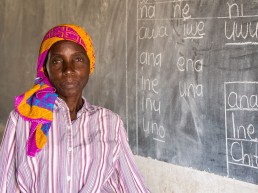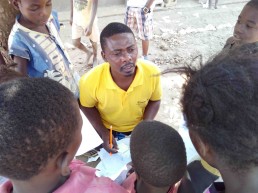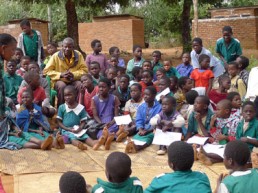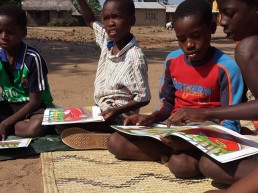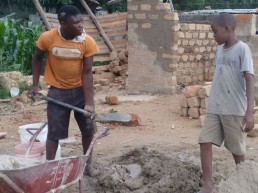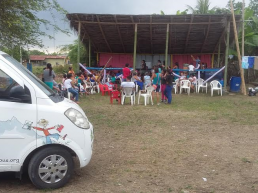Gift-a-Book Success
Success!
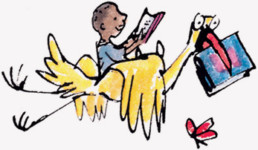
Thank you for supporting the Book Bus Gift-a-Book campaign, your beautiful Gift-a-Book cards are on their way to you.
Every donation The Book Bus receives helps us source quality books from international and local publishers that the children of Zambia enjoy reading either for pleasure, for their education or even both!
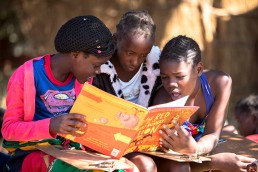
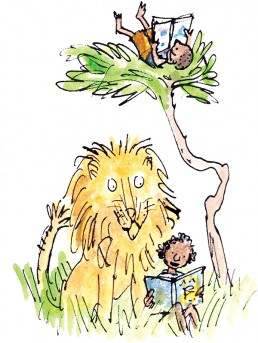
There is a chronic shortage of books and reading resources in most of Africa – thanks to your help we source THE book that children want.
The Book Bus supply only books that we know work in remote rural learning environments, that teachers ask for and that the children they teach love to read. We know that the children learn from these books – they are not just any old books.
We are committed to changing lives one book at a time but that is only made possible through your support.
Gift-a-Book

Our Gift-a-Book card buys books for children who have none.
How does it work?
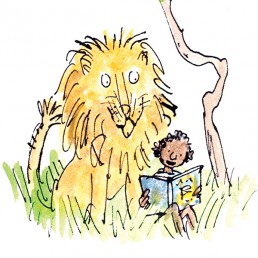
We ask you to donate £10 for each Gift-a-Book Card. You have four beautiful Quentin Blake designs to choose from.
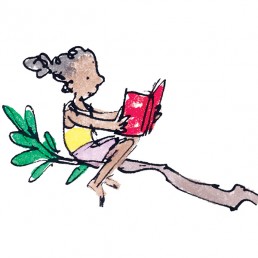
Your cards will be sent to you by Royal Mail (UK addresses only please). You fill out your personal message on the Gift-a-Book card and send it to its lucky recipient.
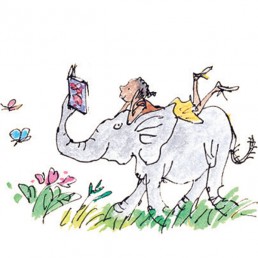
Every £10 donation is used to buy new books chosen by our expert literacy team for children in Zambia.
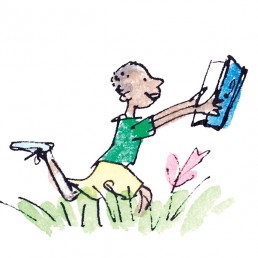
These fabulous books become part of the Book Bus mobile library service or are donated to schools and community libraries every year.
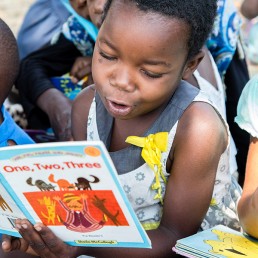
Each book is enjoyed and read by many children.
How to buy
Use PayPal, it’s a safe and secure way to buy online.
Choose from our four Quentin Blake designs shown below.
Click ‘Add to Cart’. You can order multiple copies of the same card.
Covid-19 Contingency Plan
The Book Bus Foundation:
Covid-19 Contingency Plan
Book Bus school and library projects have been put on hold but our staff are developing new ways of keeping children reading.

As of 25 March 2020, 165 countries have closed all their schools due to Covid-19, affecting nearly 1.5 billion learners and 63 million primary and secondary school teachers. This number is predicted to rise. The closures pose unprecedented challenges for education systems throughout the world.
The impact of the Covid-19 Pandemic has already affected children benefitting from The Book Bus projects in Zambia and Malawi. The highly successful Book Bus “I am a Reader” programme for primary school children in Zambia was paused on 20 March 2020, we will reinstate “I am a Reader” when the situation in Zambia is stable enough for activities to resume.
The Book Bus community library in Malawi is temporarily closed and ownership transferred to our local partner organisation Community Initiative for Self-Reliance (CISER). CISER will re-open the library when it is safe to do so and continue to provide the children of Maldeco access to its wonderful books in the future.
The Book Bus International volunteer programmes for child mentoring in 2020 and 2021 have been cancelled for now, the situation will be reviewed once the effects of the Covid-19 Pandemic within Zambia are clear.
The school closures have been sudden and because of this little attention has been given to providing distant learning facilities for children. Teachers now need adequate training on how to ensure the continuation of learning and how to develop relevant, high-quality distance education packages.
To meet these challenges, our response to the Covid-19 crisis we are developing new ways to deliver quality distance learning for teachers and learners alike. The Book Bus team in Zambia is working through the Ministry of Education to train teachers on how to adapt to new learning platforms and develop new strategies to engage their children. Book Bus staff have also been participating in and delivering other forms of education, for example communicating measures that prevent the spread of the virus, ensuring that children are safe and supported.
Revised activities whilst schools are closed
Our activities will support teachers in our project schools with training and resources to ensure children continue to read and learn during the current crisis, then re-join our project as soon as it is safe to do so. We will continue to monitor the current situation and in the mean time we have created an interim action plan as follows:
1. Teacher training: Continuous Professional Development – Teach 2030
The Book Bus have been appointed by the Commonwealth Education Trust as a facilitating partner of the Teach 2030 online Continual Professional Development programme for teachers in Zambia.
2. Distance learning for children: “The Book Bus reads” – a storytelling series for online sharing
Book Bus staff have been developing their story-telling and video production skills to create a series of storytelling videos that are available through The Book Bus Zambia YouTube channel.
3. Teacher training: Research and development of teacher training material
The Book Bus team in Kitwe are constantly researching and developing lesson plans and teaching sessions for children’s books that complement the school curriculum. This will put us in a much stronger position when “I am a Reader” resumes.
The Book Bus is working hard to continue supporting reading and changing lives throughout the Covid-19 crisis and we wish all of our staff, supporters and beneficiaries the very best during these times of uncertainty.
The Book Bus is working hard to continue supporting reading and changing lives throughout the Covid-19 crisis and we wish all of our staff, supporters and beneficiaries the very best during these times of uncertainty.
Virtual Store
Books, new tyres for the bus, or fuel to keep it going - your one off donation will help transform lives through reading!
Welcome to The Book Bus Virtual Store
Donate items* to The Book Bus
Add items to your shopping cart and check out to donate their total value:
Donate a Book Bus
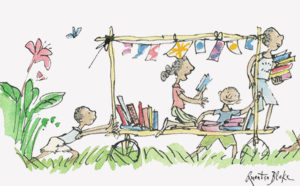
Add a bus to our fleet. Give the gift of reading to more children, in more locations!
*The prices here are representative estimates of the items that The Book Bus purchase must part of its standard operation. Your donation will be used by The Book Bus in the most effective manner possible from the time of donation. That might include the purchase of the “item” you have selected, or your donation might contribute to other necessary outgoings. It will likely be used in conjunction with other funds.
Any questions?
If you have any questions, please call us 0208 099 9280 or email us at info@thebookbus.org and we’ll get back to you as soon as we can.
What our Volunteers say
The Book Bus International volunteer programmes for mentoring child readers in Zambia for 2020 and 2021 have been cancelled for now, the situation will be reviewed once the effects of the Covid-19 Pandemic within Zambia are clear.
What our Volunteers say
Read about our real life volunteer experiences from the Book Bus in Zambia.
The returning volunteer…
Librarian, Adrian Thompson volunteered in Zambia in 2017, his 4th time with the Book Bus.
“The Book Bus team make the whole experience of volunteering work brilliantly, with their organisational skills, knowledge of the local area, and of the Zambian education system. There is a real exchange going on, sharing ideas from volunteers who join the project,“ said Adrian.
Adrian spoke positively about the way volunteers worked as partners with local teachers, and the Book Bus team sharing skills and ideas that can be used to develop engaging reading sessions for children in the future.
“After spending the morning working with the Book Bus,”, continued Adrian “volunteers can go on afternoon safari drives, or visit the Devil’s Pool at Victoria Falls. Weekends can be spent on safari, so volunteers always have something to do.”
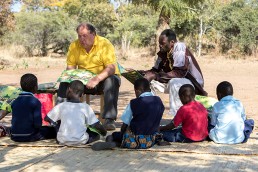
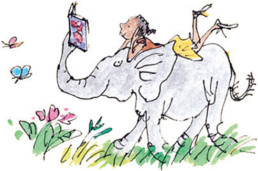
Families together

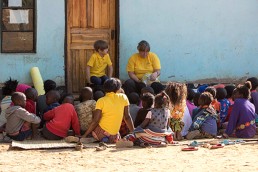
Toby and Sabine are a son and mum team who volunteered with the Book Bus in Livingstone during 2017.
Aged nine, Toby was one of our youngest volunteers and his enthusiasm for reading was something he was able to share with the children he met. He particularly enjoyed the one-to-one reading sessions: “It was great sitting down and reading with children of a similar age to me. I was amazed at how eager the children were to learn how to read, “ said Toby.
Mum, Sabine has a professional background in literacy and art, and has delivered music and drama workshops in schools, experience which she put to good use for the Book Bus. As Sabine pointed out, “Flexibility is essential, especially when helping to run the holiday reading clubs in Zambia as everyday you are unsure how many children might show up!”
Volunteering as a family was something both Sabine and Toby wanted to try, “Spending quality time together in such a different environment, and working together, a little out of everyone’s comfort zone, can lead to families learning a lot about each other,” concluded Sabine.
Bookish fun
Having spent her life in the world of books, recently librarian retiree, Carol Williams joined us for lots of bookish fun as a reading volunteer in Zambia.
“I had heard about the Book Bus several years ago,” explained Carol “and having recently retired, I decided it give it a go. The charity’s aim is ‘to improve child literacy rates by providing children with books and the inspiration to read them’, and volunteers, working alongside Book Bus staff, are the key to making this happen. I felt that my skills from years as a school librarian would be a good fit.
“On a typical day we would be up early for breakfast at 7am, and travel in Book Bus Charlie (mobile library) to start work in school at 9am, running two reading sessions with groups of children. The school might be in a suburb of Livingstone, or more rural, in which case we might pass zebra, elephants and impala en route. Very exciting! There are 72 languages spoken in Zambia, but English is the key to getting on, so we mostly use picture books in English with one of the Book Bus Zambian team on hand to help with translate when necessary. The afternoons were a mix of preparation for the next day and visiting local libraries to offer one-to-one reading sessions,” Carol continued.
“My lasting impressions from the trip are all to do with the people. Inspirational adults have set up and run local schools in deprived areas. Enthusiastic children keen to learn is a bit of a cliché, but it was so true as they put their all into the work they did. The Book Bus is obviously well respected, making a real impact in Zambia. Try it and surprise yourself! ” Carol concluded.
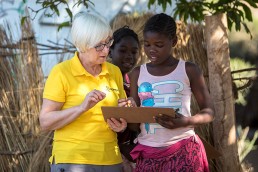
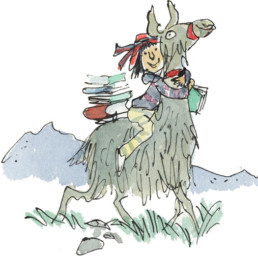
Testimonials
I would recommend the Book Bus experience to anyone.Victoria, 2015
An incredible experience as you contribute to existing reading programmes that really do make a difference.Andrew, 2016
It's unique and fun. Volunteers are valued and appreciated.Diane, 2016
The experience was challenging, eye-opening but above all deeply rewarding.Susannah, 2017
Child Protection Policy
Child Protection Policy
1 Introducing the Child Protection Policy
1.1 Why we need a Child Protection Policy
The Book Bus engage annually with up to five thousand children and these numbers are set to increase with our growth targets. Children participate in a wide range of regulated activity1 organised by our staff and implementing partners and which are delivered on or off the Book Bus and in host school premises.
Over recent years, there has been increasing recognition that the abuse of children can and does happen in organisations, and a growing acceptance of the potential risks to children from adult unintentional acts and deliberate actions. Unintentional acts can happen due to a lack of ‘due diligence’ and organisational negligence. It can lead to acts of harm such as child injury or abduction due to inadequate care and supervision or lack of policies and procedures to inform staff planning and practice. It can also emerge from a lack of staff compliance with legal requirements. Deliberate actions are taken by people with intent to abuse children. Research and practice tell us that predatory offenders with the intent to abuse children sometimes deliberately place themselves in an organisation and/or job that give them access to children.
The Book Bus is concerned about the welfare and safety of children and recognises that we have a fundamental duty of care towards all children we engage with. We take our responsibility seriously to ensure we are doing all we can to protect children from abuse, both from within and outside the organisation, and to take appropriate action if such abuse occurs.
1.2 Purpose of a Child Protection Policy
Child protection is not just about health and safety. Even though we have a Health & Safety Policy, and carry out risk assessments, this does not cover all the situations and circumstances we need to address in relation to the protection of children. Therefore we need an additional policy that considers all aspects and steers us as an organisation to do all that we can to keep children safe and operate ethically.
Its purpose is to help us to develop a common understanding of child protection issues, develop good practice across the diverse and complex areas in which we operate and thereby increase accountability in this crucial aspect of our work. This policy, when put into practice, will help make sure that children are protected. It also ensures that staff, volunteers and other representatives are protected. This aspect of good governance is also critical in maintaining the reputation and credibility of the Book Bus.
1.3 What is a Child Protection Policy?
A Child Protection Policy is an organisation’s commitment to protect children from abuse, exploitation and organisational negligence. This is reflected in the way an organisation conducts its activities and the way staff behave. Child Protection Procedures are how an organisation puts its policy into action. Examples of typical organisational child protection policy & procedures include safer recruitment and screening processes for those working with the Book Bus, codes of conduct for staff and volunteers, guidance on the appropriate use of children’s images and information and requirements for staff to report suspected or actual abuse.
For the Book Bus major challenges in developing a Child Protection Policy arise due to the number of countries and different contexts we work in, and the diversity of our operations. This Child Protection Policy sets out the broad framework and expectations, and it is recognised that at country level teams will have to identify how to implement the policy, given the local operating conditions and legal provisions.
1.4 Who is defined as a child?
In this policy, a child is defined as anyone who has not reached their 18th birthday irrespective of the age of majority in the country where a child is, or their home country. ‘Children’ therefore means ‘children and young people’ throughout. Although the national law in the country we are working in may have a different age at which a child is considered an adult, or have a different age at which a child can give consent or is responsible, we use the definition of a child according to UK and international law since the Book Bus is a UK organisation working internationally. This comes from the UK Children Act, 1989 and United Nations Convention on the Rights of the Child, 1989. The United Nations Convention for the Rights of the Child is the international framework which sets out the specific rights of children; it is the most widely ratified international human rights instrument which over 190 countries have signed.
1.5 Who is the audience for the Child Protection Policy?
The policy covers and positively benefits children we engage with throughout the organisation. This policy is mandatory for all Book Bus staff, world wide. For the purposes of this policy ‘staff’ is defined as anyone who works for the Book Bus, either in a paid or unpaid, full or part time capacity. This includes directly employed staff, trustees, contractors, agency staff, consultants, volunteers and interns. It also covers implementing partners whom we fund, and who we should expect to agree to work under the policy as a condition of their involvement with the Book Bus.
1.6 What are our responsibilities?
Everyone shares responsibility for safeguarding and promoting the welfare of children irrespective of individual roles. Our policy is for all staff to be responsible for implementing this policy and the reporting procedure detailed in section five if they receive or become aware of any of the following situations in relation to:
• any allegation of or concern about actual or suspected situations of abuse involving a child or children known to the Book Bus.
• any allegation of or concern about actual or suspected staff misconduct and/or criminal activity involving the abuse of a child or children whether or not they are known to the Book Bus.
1.7 How the Child Protection Policy fits with other policies within the Book Bus
There are numerous policies and procedures that have already been developed by the Book Bus. This policy is not intended to contradict or undermine these, but instead to complement and reinforce attempts to protect children contained in other policies. Over time, some of these policies may be harmonised with the Child Protection Policy to ensure that there are no contradictions. In the meantime, if discrepancies exist, then guidance should be sought from the Book Bus HQ, who will be able to support country offices in making the best decision for children.
1.8 Principles underpinning the Child Protection Policy
A number of key principles underpin the provisions of the Child Protection Policy. These include:
• Best interests of the child are paramount and shall be the primary consideration in our decision making.
• Child centred and rights based approach in order to keep children sharply in focus in all our planning and direct work. Some of the worst child protection incidents have happened when staff have lost sight of the child and their rights to be protected.
• Equality of opportunity to ensure that all children have the opportunity to enjoy our activities safely regardless of their gender, ability, race, ethnicity, circumstances or age. Vulnerable children will require particular attention in order to optimise their safety needs and promote their access to important opportunities.
• Taking responsibility in order to meet our obligations regarding our duty of care towards children, and taking action where we believe that a child is at risk or is actually harmed.
• Recognising and acknowledging that an element of risk exists, and while we may never be able to totally remove this, we need to do all we can to reduce it or limit its impact.
• Honesty and transparency by informing those we work with, including children, about our Child Protection Policy, and the way we work to try and protect children.
• Confidentiality to protect sensitive personal data. Information should only be shared and handled on a need to know basis, that is, access to the information must be necessary for the conduct of one’s official duties. Only individuals who have legitimate reasons to access the information are allowed to receive it.
• Supporting and training those working with the Book Bus to recognise and respond to child protection risks and incidences.
• Working with others to protect children. This includes involving law enforcement and specialist child welfare agencies where necessary.
• Monitoring the implementation of the Child Protection Policy. The Child Protection Policy will be reviewed every three years.
1.9 Complaints
In this policy it is important to understand the difference between a complaint and an allegation as our response will be different. Complaints are generally an oral or written expression of dissatisfaction or concern about facilities or services. An allegation is an oral or written declaration of wrong doing or assertion of misconduct or criminal behaviour, the validity of which has not been established yet.
This section deals with a complaint about the implementation of the Child Protection Policy by the Book Bus. Go to section 5 of this policy for advice on how to respond to allegations of misconduct or criminal behaviour.
Children and their parents or carers who wish to make a complaint to express dissatisfaction or concern about how they have been treated by the Book Bus regarding the implementation of this policy should in the first instance speak with their main contact point at the Book Bus, who can then arrange for the appropriate follow up actions to be taken.
It is important when considering child protection that we have a shared understanding of child protection and what it means. If we do not fully understand what we are protecting children from, then it is unlikely that we will be successful in our efforts.
2 Understanding Child Protection Issues
2.1 What are we protecting children from?
In the context of this policy, when we talk about ‘child protection’ we do not mean preventing accidents (covered by our Health and Safety Policy) or making sure that a child’s rights (principally as defined in the United Nations Convention on the Rights of the Child) are fully implemented. Instead we are referring specifically to the protection of children from abuse. The Book Bus uses the definition of abuse commonly used by the World Health Organisation:
‘Child abuse’ or ‘maltreatment’ constitutes all forms of physical and/or emotional ill treatment, sexual abuse, neglect or negligent treatment or commercial or other exploitation, resulting in actual or potential harm to the child’s health, survival, development or dignity in the context of a relationship of responsibility, trust or power’.
2.2 General definitions of child abuse
Internationally, four main categories of abuse are generally recognised:
Physical Abuse: This may involve hitting, shaking, throwing, burning or scalding, drowning, suffocating, or otherwise causing physical harm to a child. Physical harm may also be caused when a parent or carer feigns the symptoms of, or deliberately causes, ill health to a child who they are looking after.
Emotional Abuse: This is the persistent emotional ill treatment of a child such as to cause severe and long lasting effects on the child’s emotional development. It may involve conveying to children that they are worthless and unloved, inadequate, or valued only so far as they meet the needs of another person. It can also involve age or developmentally inappropriate expectations being imposed on children, or causing children frequently to feel frightened or in danger. Some level of emotional abuse is involved in all types of ill treatment of a child, though it may occur alone.
Neglect: This is the persistent failure to meet the child’s basic physical and / or psychological needs, likely to result in the serious impairment of the child’s physical or cognitive development. For example, inadequate care and supervision which leaves a child in a dangerous situation where they could be harmed (but only where this can be avoided).
Sexual Abuse: This involves forcing or enticing a child to take part in sexual activities, whether or not the child is aware of what is happening or gives consent. The activities may involve physical contact, including penetrative (e.g. rape) or non ‐penetrative acts. They may also include non contact activities, such as involving children in looking at, or in the production of, pornographic materials or watching sexual activities, or encouraging children to behave in sexually inappropriate ways.
Other types of abuse commonly recognised, such as commercial sexual exploitation and trafficking, are complex manifestations of a combination of the above four categories. It is important to highlight that bullying is also a form of abuse as it is an act of aggressive behavior in order to intentionally hurt another person or persons, mentally, physically and/or sexually.
Abuse can take place in many forms and anywhere, that is, in the family, community or on the Internet. Abuse is also manifesting itself in digital and augmented technologies such as smart phones. This can be virtual or real and can take many forms including sexual harassment and child pornography. It should be remembered that although we commonly think of adults as those who abuse children, children can also be the perpetrators.
2.3 Cultural sensitivity
The Book Bus seeks always to work in ways which are culturally sensitive and that respect the diverse nature of the people we work with. We recognise that there are many different ways of thinking and taking care of children and making sure they are protected. It is acknowledged that protecting children and being culturally sensitive can be a difficult balancing act, especially given the situation in many of the countries where we work. As an international organisation, however, we endorse the United Nations Convention on the Rights of the Child general principle that all the rights guaranteed by it must be available to all children without discrimination; and article 19 which affords equal rights to protection for children from abuse. Every child matters everywhere in the world. Culture must not be used as a reason or excuse to abuse children.
3 Child Protection Policy implementation
In order to assist with the implementation of the Child Protection Policy all Designated Project Coordinators act as the local Child Protection Officer.
Broad areas of responsibility for the Child Protection Officer include:
• Supporting Country Directors in implementing the Child Protection Policy
• Acting as a first point of contact for staff on all child protection issues
• Maintaining list of local specialist child welfare, health and law enforcement contacts
• Providing advice and support to staff concerned about a child protection issue and deciding what action to take
• Responsibility for escalating a concern to the Book Bus HQ and/or notifying senior managers as appropriate
• Referring cases to specialist child welfare and/or law enforcement agencies as appropriate
• Keeping accurate records that are data protection compliant.
While at first sight this role can seem onerous, it is important to emphasise that this need not be the case. If staff are made aware of, and take their responsibilities to protect children seriously, there should be relatively little for the Child Protection Officer to do – except if a situation of abuse occurs.
For UK operations, and work within the UK, the Operations Director acts as the Child Protection Officer.
4 Preventative Actions
The most important key to child safety is prevention. It is widely recognised that organizational awareness and good practice can promote positive staff action or behaviour, reduce opportunities for offending and will enable early detection and response.
4.1 Recruitment and Employment
‘Safe’ recruitment and checks that are undertaken as part of the recruitment process are the organisation’s first chance to deter potential offenders. The Book Bus will take all reasonable measures to prevent unsuitable individuals from working with children. The majority of people who want to work with the Book Bus are well motivated and without them the organisation could not operate. Unfortunately, however, some individuals may use the organisation to gain access to children for abusive and exploitative motives. Research and practice tells us that predatory offenders with the intent to abuse children sometimes deliberately place themselves in organisations and / or job roles that allow them access to children. Opportunistic and situational offenders are reactive and responsive to cues given out by the environment.
It is therefore crucial to have some sort of screening process for individuals entrusted with the care of children.
The Book Bus will take the following measures to ensure that only those who do not pose a risk to children are employed or involved in its work:
1. All job, contract and service advertisements must state that the Book Bus works to protect children and that those seeking work will be assessed regarding their suitability to work with children.
2. Before employing any staff, background screening checks must be conducted to ensure their suitability. This includes independent references and police checks (where available).
3. Where staff are to work directly with children, additional care must be taken to ensure that they are suitable. This should include checking identification, qualifications and obtaining references from previous employers.
4. Staff should be asked to sign a self declaration statement confirming that they have no convictions for any offence involving any type of harm to a child or children, and should declare anything that may affect their suitability to work with children.
5. In exceptional circumstances, it may not be possible to obtain background checks and references. In these situations a careful assessment should be made as to whether it is appropriate for the person to be put in the position of working alone with child.
6. Where allegations are made about staff, careful consideration must take place about the appropriateness of the person continuing to work with the Book Bus. This may include suspension during any internal or external investigation and dismissal if the allegation is proved.
HR should be consulted and involved in all processes concerning directly employed staff to ensure that workers’ employment rights are not violated. The first point of contact with HR should be the office that was responsible for appointing the staff member / where their contract was issued.
4.2 Training, supervision and support
Once staff has been recruited they need to be adequately trained and supervised to ensure that any risks to children are minimised. This will be achieved through ensuring that:
1. All staff complete the mandatory child protection basic awareness learning module.
2. All staff are informed about the Child Protection Policy, and given the opportunity to discuss its implications for them with the local Child Protection Officer as part of their induction / orientation.
3. In general staff are not allowed to work alone with a child somewhere which is secluded or where they cannot be observed. It is acceptable for staff to work alone with a child where there are visibility panels / windows in doors.
4. All activities are supervised by staff. The number of staff will be determined according to the age and capacity of the children, and should always be sufficient with the necessary skills and qualifications consistent with the scope of work / role expected.
5. Where the Book Bus arranges for visits, no child should be left unsupervised with a visitor to a programme or scheme.
6. No activity or programme is undertaken with children without the express written permission of their parents / guardians.
7. All staff should sign a Code of Conduct specific to the protection of children (see following section) before working with any children.
8. Staff should be informed about the policy of the Book Bus in relation to the use of technology (such as computers and mobile phones), and understand that they must not use this technology for the purpose of accessing, producing or distributing any information or violent or sexual images that are harmful for children. This includes adult pornography.
9. Where staff are contracted by other employers, or when working with partners, the Book Bus will ask for information on how the organisation works to protect children (such as their child protection policy).
10. Staff will have access to supervision, support and training regarding child protection and the implementation of the Child Protection Policy, via the Child Protection Officer and the Book Bus HQ
4.3 Professional Code of Conduct
Since ideas about child care vary, all staff should be required to sign a code of conduct regarding the protection of children, the behaviour expected of them and their responsibilities in relation to the children they come into contact with as a result of their work with the Book Bus. Individual country offices should develop this code of conduct to fit their local operating context.
While the code of conduct will vary from country to country, it should include:
• Agreement to work under the Child Protection Policy as a condition of involvement with the Book Bus
• Provisions regarding acceptable behaviour in the workplace – for example, not to use physical punishment or chastisement, however acceptable or moderate it may seem, not to use language intended to belittle or humiliate children and not to abuse children in any way (including not to engage in any sexual activity with anyone below the legal age of sexual consent)
• To report any concerns they may have about the protection of children, in accordance with this policy
• To observe confidentiality and not talk about any situations of actual or suspected abuse that occurs except in accordance with this policy. This is necessary to protect the privacy of those involved
• Not to pay for sexual services, of any kind, with anyone under the age of 18 years old, even if the age of sexual consent is under 18 years.
4.4 Media, communication & information
The Book Bus has a policy regarding the media and the use of images (including photographs and recordings) and stories regarding children (the ‘Acceptable Usage Policy’).
This should be applied in all situations. Specifically relating to child protection, we will:
1. Ensure that personal information is kept confidential unless we have the agreement of the child and their parent/guardian, except where it is necessary to pass this to a specialized child welfare or law enforcement agency in relation to a child protection incident.
2. Use images of children which are respectful (not degrading, or showing sexual images of children naked or partially clothed).
3. Reproduce images of children only where we have the written permission of their parents / guardians.
4. Make clear to children and their families that agreement to providing information or images is not a condition of involvement in Book Bus activities and programmes.
5 Reporting – Responding to Allegations and Concerns
It is anticipated that, if this policy is properly implemented, the chances of an actual situation of abuse occurring from within the organisation will be reduced. Even so, incidents may still arise or information comes to light about the behaviour of another staff member which creates cause for concern. We may also become aware of situations of actual or suspected abuse from outside the organisation.
Child protection is a tricky and complex area. Speaking out when there is child abuse can be difficult. The nature of child abuse means that it is hard to acquire concrete evidence. Staff is more likely to be faced with indirect statements from children, non verbal clues and signs which can be inconsistent. When actual disclosures of abuse are made they are often retracted. For this reason, when faced with child abuse, staff are more likely to have feelings of concern; an intuition or suspicion that something is happening but doubt their judgement and/or feel uncomfortable about saying anything or raising the concern as they do not believe they have enough evidence. Because of the often secret and intimidating nature of abuse and the severe impact it can have on children, however, it is essential that people speak out.
It is not the responsibility of staff to decide whether or not child abuse has taken place. All staff, however, have a responsibility to act on any concerns by reporting these to the Child Protection Officer and/or Book Bus HQ. They are a specialist and confidential resource available for staff to talk to about any concerns, no matter how small and insignificant they may seem, and will provide advice and support and decide what action to take.
To ensure that all such situations are handled appropriately and effectively, a reporting mechanism has been created:
1. All allegations and concerns of abuse must be taken seriously, irrespective of the identity of the alleged perpetrator and victims, and regardless of how ‘unbelievable’ the situation may seem.
2. All staff must report any of the following situations in relation to:
• any allegation of or concern about actual or suspected situations of abuse involving a child or children known to the Book Bus
• any allegation of or concern about actual or suspected staff misconduct and/or criminal activity involvingthe abuse of a child or children whether or not they are known to the Book Bus.
3. No staff member can agree to keep information regarding actual or suspected abuse ‘private’ as a personal confidence. In general, the Book Bus will seek to discuss our concern with the child in a way that is appropriate to the child’s age and understanding, and with their parents/guardians, and seek their agreement if making a referral to a specialist agency. However, there will be situations where this may place the child in danger. A decision to refer to a specialist agency without informing the child and without obtaining the consent of their parents/guardians should always be taken by the Child Protection Officer in consultation with the Regional Child Protection Manager/Head of Child Protection.
4. The Book Bus is not an investigative authority. It is essential that referrals be made to the relevant child welfare and law enforcement agency to ensure that appropriate protection and support is given to the child, and that any evidence is collected in accordance with the law.
5. A written record of all child protection reports, including any decisions made, must be kept up to date by the Child Protection Officer and logged on the child protection reporting form. This should include details of any referrals made to specialist agencies.
6. All sensitive and personal data must be kept confidential (including the names of anyone who makes a report of abuse), and be shared on a strictly ‘need to know basis’, that is, access must be necessary for the conduct of one’s official duties.
7. Referrals must be made to a specialist child welfare and law enforcement agency when sufficient evidence exists that an allegation or concern is a serious welfare and/or criminal matter, according to the Reporting Flow Chart. Apart from referrals to child welfare and law enforcement agencies, no details regarding the circumstances of children and their families will be passed to other individuals or organisations without the express permission of the child and their parents / guardians.
8. Names of those who are alleged to be a risk to children will also be passed on to law enforcement agencies where it is suspected that a crime may have been committed, for investigation in accordance with relevant legislation. This will normally be the local police agency, although where either the alleged abuser or the child is from another country, a report should also normally be made to the appropriate embassy in country. This is because, for some crimes and in some countries, legalisation exists to prosecute suspected offenders in their home country if the local legislation is not comprehensive or is not implemented.
9. Where a member of staff is the subject of an investigation (but not when making a report), an Internal Child Protection Investigation Panel will be convened by the Head of Child Protection. The panel will work alongside any formal police investigation. The composition of the panel depends on the nature of the allegation or concern but will routinely consist of a representative from Human Resources and Legal.
10. In situations where non local staff (e.g. Book Bus employed expatriates) are suspected to be involved, either as the victim or the perpetrator, the local relevant Embassy should be informed regardless of diplomatic status. This is important because, in some countries where there are weak laws to protect children, perpetrators can be prosecuted in their own home country. Many embassies have a police liaison officer who can work with local police to ensure that evidence and information is collected in the appropriate way, and that support is offered to victims.
11. Where abuse is sent or received via the Internet or other technologies (such as child pornography images), even if this is received in the form of ‘Spam’ or passed on to the Book Bus from another organisation, the images MUST NOT be sent via the Internet to law enforcement agencies or to any other person working for the Book Bus, including the Book Bus HQ. Instead they should be contacted and asked to advise how to send the information. This is because the distribution of child abuse images (i.e. child pornography) is illegal under international (and in some cases domestic law). Links to websites can be sent to law enforcement agencies by email.
12. If a report of abuse is made, or concerns are raised, even if the situation is ultimately found to be untrue, no retaliatory action will be taken against the person making the report in line with our ‘Speaking Out Policy’. If, however, the report is found to be malicious, the staff member will be offered support and Human Resources will decide on the course of action relating to disciplinary and suspension issues.
13. Each country office should maintain a Child Protection Briefing Note which includes information about specialised child welfare and law enforcement agencies and the appropriate mechanism under the national law for reporting concerns so that this information is readily to hand.
14. It is understood that there will be unanticipated situations where staff will have to apply their independent judgment. They should do so in a way that is consistent with the principles of the policy and in consultation, when possible, with the Child Protection Officer and an available senior manager. Where staff do have to apply their own judgement in relation to a child protection issue, and it is not possible to consult with the Child Protection Officer, the Child Protection Officer should be advised of the situation as soon as possible.
6 Support and Resources
The Corporate Child Protection Team has further information and advice about keeping children safe and child protection. There are also excellent child protection resources outside the Book Bus, which are published in local languages, or are written specifically to address the local, or country, situation.
News & Views
An interview with children’s author Lady Justice Shonga
August 29, 2022
We interview author and High Court Judge, Lady Justice Bubile Shonga, learning about her latest books and why parents should introduce their children to reading.
A message from The Book Bus Zambia
February 19, 2022
As The Book Bus approaches 15 years of working in Zambia, The Book Bus Zambia team look back on their achievements of 2021 and ahead to their aims for 2022.
An interview with Zambian author Bwalya Penza
January 5, 2022
We interview author Bwalya Penza, learning why she thinks reading is important for children and how parents can introduce children to reading.
Meet The Book Bus Zambia Team: An interview with Chishimba Kaela
December 7, 2021
Learn how Chishimba's role as a Link Teacher provides inspiration to children and teachers, with a passion that fosters learning and interest.
Meet The Book Bus Zambia Team: An interview with Raj Mushili
December 7, 2021
Learn how Raj's role as a reading mentor and driver helps share opportunities through reading in Zambia, and how literacy has helped him in his own role as a parent.
Understanding how The Book Bus supports the UN’s Sustainable Development Goals
June 30, 2021
Learn how the SDGs help inform The Book Bus’s efforts to build a “more sustainable future” for children in Zambia and beyond.
Sakala’s dream: How does The Book Bus transform lives through reading in Zambia?
April 14, 2021
Understand how The Book Bus impacts children like Sakala, who needs quality books to realise his big dreams.
Why send books from the UK to Zambia?
March 18, 2021
David Gordon, CEO of The Book Bus, discusses the benefits of shipping quality books from the UK to Zambia.
Help The Book Bus improve children’s literacy this World Book Day
March 4, 2021
This World Book Day, The Book Bus is re-launching our "I'm a Reader" programme. We need your help to create 10,000 child readers by 2022.
Six ways that The Book Bus is innovatively tackling the global literacy crisis
January 18, 2021
The Book Bus aims to tackle the global literacy crisis through educational innovations and sustainable change. Learn how.
Three ways that you can support The Book Bus in 2022
January 1, 2021
Find out how to donate by ordering unique cards, shopping online, or by picking an item in our virtual store!
Reflections on International Literacy Day – Mr Mwape Meki, Head teacher, Manyando Community School
October 5, 2020
Mr Mwape Meki explains the wide-reaching impact that radio and TV can make in Zambia.
Quentin Blake’s magical art inspiring Book Bus children to read
March 19, 2018
“It’s a real privilege to be associated with the Book Bus promoting literacy in Africa and South America.”
Writing their names with pride
March 19, 2018
We can never anticipate the ripple effects one of our reading programmes might have on a local community.
Mfuwe Project, Zambia. Week 2 – Going on a Lion Hunt
March 19, 2018
Usually the Mfuwe bus travels to multiple schools, and works with different age groups for a relatively short time.
Voices of Africa – Roseby Gadama, Librarian in Malawi
March 19, 2018
Voices of Africa is a new monthly Book Bus feature, sharing stories from inspiring voices in the various Book Bus communities.
A reading programme with impact
March 19, 2018
“My favourite book is The Hare and the Tortoise. I like the way the tortoise takes his time but wins the race,” says 10 year old Angela Beaston.
Where did our school go?
March 19, 2018
Imagine turning up for school one morning and the building is no longer there?
Book Bus Alfie: A shining star in Ecuador earthquake aftermath
March 19, 2018
"Book Bus Alfie has been the star for us. Everywhere we went, Alfie brought books for the kids.”
Where Your Money Goes
We depend on private donors, foundations and sponsors to cover everything we do and we are committed to transparency.
Since our first book-filled bus set off to Zambia in 2008, hundreds of volunteers and supporters have raised enough to commission six more vehicles. These busy buses have delivered books and resources to thousands of children in Zambia, Ecuador and Malawi.
Generous donations enabled us to launch the “I am a Reader” project in Zambia and Malawi in 2017. This strategic four-year project had created 10,000 new child readers by 2020. The project continues in Zambia where we aim to produce another 10,000 new child readers by 2022.
Your money is improving children’s lives every day
A breakdown of how we spent our money in 2018/19.

Running costs and raising funds – 15%
Fifteen pence in every pound allows us to run our office, pay salaries, run the charity, monitor how projects are progressing and raise more money for the future.
Charitable activities – 85% of funding
Some 85% of Book Bus funding in 2018/19 was spent on the charitable activities detailed in our Impact Report. These are making a huge difference in providing children with the essential reading skills they need.

Download and explore our latest report.
More about how we make a difference
1. Book Bus outreach programmes
What?
Creating links with schools and working with them to identify needs.
How?
School surveys, research and development, logistics, monitoring and evaluation.
2. Libraries and reading corners
What?
Working with teachers and local teams, we create creating inspirational reading environments for children.
How?
Renovation and/or adaptation of libraries, schools and homes.
3. Books
What?
We Provide free access to books that are engaging and relevant.
How?
By supplying books to schools, libraries and homes.
4. Teacher training and support
What?
Capacity and skills building for staff, teachers and volunteers.
How?
Professional development, teacher training and reading scheme implementation, training for Book Bus staff, school teachers and recruitment, training and management of volunteer reading mentors.
5. Monitoring and evaluation
What?
Applying processes to measure children’s reading levels and identify their learning needs.
How?
Ongoing survey and analysis of results to determine project success.
6. Securing a sustainable future
What?
Embedding the Book Bus approach within the school system.
How?
By building partnerships with local government and other NGOs within the field of education.
With your help we can continue to change children’s lives through the power of reading
In 2017, we began our four-year “I am a Reader” strategy, which aims to get 10,000 children reading by 2020.
We are determined to rise to the challenge of this ambitious target and by the start of 2018, some 6,400 children in Kitwe, Zambia had already enrolled.
We couldn’t have made such a great start without your amazing support and generosity. Thank you!
Volunteer
The Book Bus International volunteer programmes for mentoring child readers in Zambia for 2020 and 2021 have been cancelled for now, the situation will be reviewed once the effects of the Covid-19 Pandemic within Zambia are clear.
Read. Listen. Change Lives.
If you are aged between 18-75, have a passion for reading, are happy to mentor children and are willing to take the journey of a lifetime – we would love to hear from you.
You can volunteer for as little as 14 days or for up to one month. The choice is yours.
Want to know more? Contact us 0208 099 9280 or email us at info@thebookbus.org
The Zambia Volunteer Project 2019
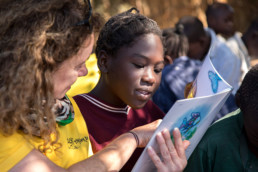
UNICEF estimate that 30% of boys and 40% of girls leave school in Zambia unable to read.
A lack of materials and class sizes of 80 or more remain a constant obstacle to learning. Teachers do not have the time or opportunity to help with individual and smaller group learning.
The Book Bus volunteer reading assistants provide the kind of dedicated support that can make all the difference, working with primary school children and supporting the on-going work of our Zambian Book Bus literacy team.
In 2019, The Book Bus volunteer project worked in Livingstone from Monday 1st July to 6th September in local reading clubs and throughout the holiday period. Our dedicated volunteers worked with small groups of children in reading support programmes in and around Livingstone. They also helped run reading workshops in the local libraries.
The volunteers did not need any prior, special teaching skills or experience. They came equipped with enthusiasm, and an ability to read, listen and engage with activities.
Where? The project took place in Livingstone, Zambia
Age: The volunteers were aged 18-75 (under 18’s volunteered by special arrangement)
Accommodation: The volunteers shared twin-rooms in Kaazmein Lodge, Livingstone
Food: Daily breakfast was provided
Support: The Book Bus provided pre-departure induction, in-country coordinator, and 24-hour emergency support
Project dates: The project ran from 1st July to 6th September 2019
Availability: There were 12 places available
When to apply: The Zambia Volunteer Project is taking a year off in 2020 to focus on other ways of supporting literacy in Zambia. To discuss alternative ways to get involved, please contact us 0208 099 9280 or email us at info@thebookbus.org

Meet The Fleet
Our six Book Buses are the charity's international flagships; each an ambassador for our cause and together bringing joy and delight to thousands of children.
You can adopt a Book Bus for yourself, or as a gift for a book lover, from as little as £5 a month for 12-months.
Your gift will mean a new generation of children can be introduced to the wonders of reading.
Adopt Charlie
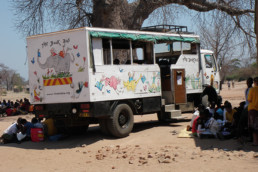
Charlie was our first overland truck converted to a bus, and he’s still the largest.
A lovely book mover, he has side-stepped hazards, humps and hippos to bring books to kids in remote parts of Zambia. He’s getting on a bit, and with expensive tyres and parts, he needs a little more TLC.
Charlie was a gift from Clifford Chance Solicitors
Can you help keep Charlie in tiptop condition?
Adopt Matilda
Matilda was the star attraction at the 2016 London Book Fair before she shipped out to Africa from the UK.
She loves excitement and adventure and is not afraid to get her wheels dirty. Matilda supported our project partners in Malawi for 4 years by delivering books to schools in communities around Lake Malawi. From 2020 Matilda will join the Book Bus team in Zambia to help develop our projects in Kitwe and Lusaka.
Matilda was a gift from Motovun Group
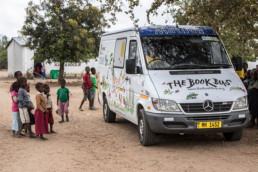
Can you help keep Matilda on the road?
Adopt George
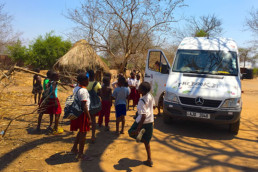
George started life as a police van in the Thames Valley and now working in the copper mining region of northern Zambia.
Not too big and not too small, he works hard to grasp the six main languages spoken in Zambia and delights children every week with the hundreds of books he delivers.
George was a gift from Miles Kelly Publishers
Can you adopt George and help him deliver books every day?
Adopt Alfie

Was Alfie the fastest little book bus in the whole of South America? Alfie certainly thinks so.
For a little fellow, Alfie carried a lot, 500 books in one go to be exact. From 2010-2019, he worked tirelessly in and around Puerto Lopez in Ecuador, bringing reading pleasure and life skills to his friends, the children.
Alfie was a gift from Dave Otter and friends
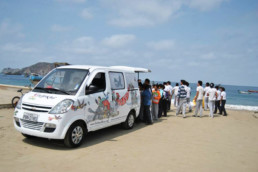
Can you help keep a Book Bus' wheels turning?
Adopt Tiger
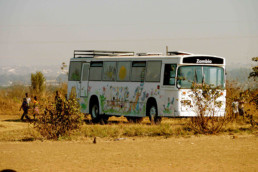
Tiger likes to keep his cool these days as he sits outside Acacia School in Livingstone, Zambia.
A static library, Tiger once roamed the roads of England before he was prepared for a new life as a Book Bus. Thousands of children have clambered aboard him to read, learn and have fun.
Tiger was a gift from Tom Maschler, The Book Bus Founder

Can you adopt Tiger and keep the library open?
What does adoption cost?
Adopt a bus of your choice from as little as £5 a month for 12-months.
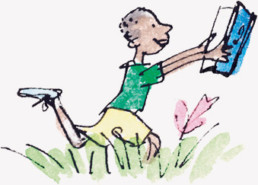
You can even add an extra monthly amount; just decide which bus you’d like to fund and click through to complete your adoption and we’ll send you your adoption pack.
What is in your book bus adoption pack?
- A beautiful adoption certificate illustrated by Sir Quentin Blake
- A special ‘hello’ from your adopted Book Bus
- More information about the work of the buses in Ecuador, Malawi and Zambia
